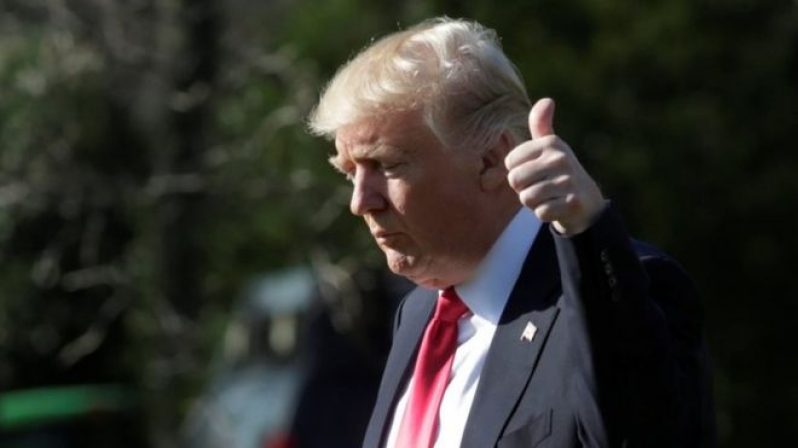[BBC] – US President Donald Trump has defended his “absolute right” to share information with Russia, following a row over classified material.
Mr Trump tweeted that he had shared “facts pertaining to terrorism and airline safety” and wanted Russia to do more against so-called Islamic State.
He met Russian Foreign Minister Sergei Lavrov in the Oval Office last week.
US media said Mr Trump had shared material that was passed on by a partner which had not given permission.
A report in the Washington Post said Mr Trump had confided top secret information relating to an IS plot thought to centre on the use of laptop computers on aircraft.
Mr Trump’s move is not illegal, as the US president has the authority to declassify information.
The action drew strong criticism from Democrats and a call for an explanation from his own Republican party.
What was the president’s defence?
In his tweets early on Tuesday, Mr Trump said: “As President I wanted to share with Russia (at an openly scheduled W.H. meeting) which I have the absolute right to do, facts pertaining to terrorism and airline flight safety.
“Humanitarian reasons, plus I want Russia to greatly step up their fight against [IS] & terrorism.”
It is not clear if Mr Trump was acknowledging having shared intelligence secrets with the Russian officials, thus contradicting White House statements, or whether he was simply trying to explain what had been discussed.
The BBC’s Anthony Zurcher in Washington says this was a carefully constructed defence of the meeting, in which President Trump frames any revelation of intelligence information as a calculated move to advance US national security priorities.
After all, the controversy that swirled around the White House on Monday night was never legal, it was political, and this defence may be enough for Republicans to rally around, he adds.
Top Senate Democrat leader Chuck Schumer has called on the White House to release the transcripts of the meeting.
What happened in the Oval Office?
In a conversation with the Russian foreign minister and Russian ambassador Sergei Kislyak in the Oval Office, the president revealed details that could lead to the exposure of a source of information, officials told the Washington Post.
The intelligence disclosed came from a US ally and was considered too sensitive to share with other US allies, the paper reported.
Others at the meeting realised the mistake and scrambled to “contain the damage” by informing the Central Intelligence Agency (CIA) and the National Security Agency (NSA), says the Post.
The meeting came a day after Mr Trump fired his FBI chief, James Comey, sparking criticism that he had done so because the FBI was investigating his election campaign’s alleged Russian ties.
How did the White House initially respond?
National Security Adviser HR McMaster told reporters the story, “as reported”, was “false”.
“At no time – at no time – were intelligence sources or methods discussed. And the president did not disclose any military operations that were not already publicly known.”
The statement was echoed by Secretary of State Rex Tillerson.
But the Washington Post said this did not amount to a denial.
Speaking to the BBC, Post reporter Greg Jaffe said the story made it clear the president did not disclose sources or methods.
But he added: “Our story says that the nature of the information provided would have allowed the Russians to ‘reverse engineer’ to discover the sources and methods. He said so much that they could figure it out.”
What has the reaction been?
- “This is dangerous and reckless” – Dick Durbin, Senate’s second-highest ranked Democrat
- “Mr President, this isn’t about your ‘rights’, but your responsibilities. You could jeopardise our sources, relationships and security” – Adam Schiff, top Democrat on House Intelligence Committee
- “A troubling signal to America’s allies and partners around the world and may impair their willingness to share intelligence with us in the future” – Republican Senator John McCain
- “We have no way to know what was said, but protecting our nation’s secrets is paramount” – spokesperson for Republican House Speaker Paul Ryan
- Congress could do with “a little less drama from the White House” – Mitch McConnell, Senate majority leader
- “We generally do not want to have anything to do with this nonsense” – Dmitry Peskov, Kremlin spokesman
- “If true, this is not going to instil confidence in allies already wary of sharing the most sensitive information” – senior Nato diplomat quoted by Reuters
Levels of US classification – from lowest to highest
- Confidential: Information that reasonably could be expected to cause damage to the national security if disclosed to unauthorised sources. Most military personnel have this level of clearance
- Secret: The same wording in the first sentence above, except it substitutes serious damage
- Top Secret: Again, the same wording except to substitute exceptionally grave damage
- Codeword: Adds a second level of clearance to Top Secret, so that only those cleared with the codeword can see it. Administered by the CIA. The material discussed by Mr Trump with the Russians was under a codeword, sources told the Washington Post.












